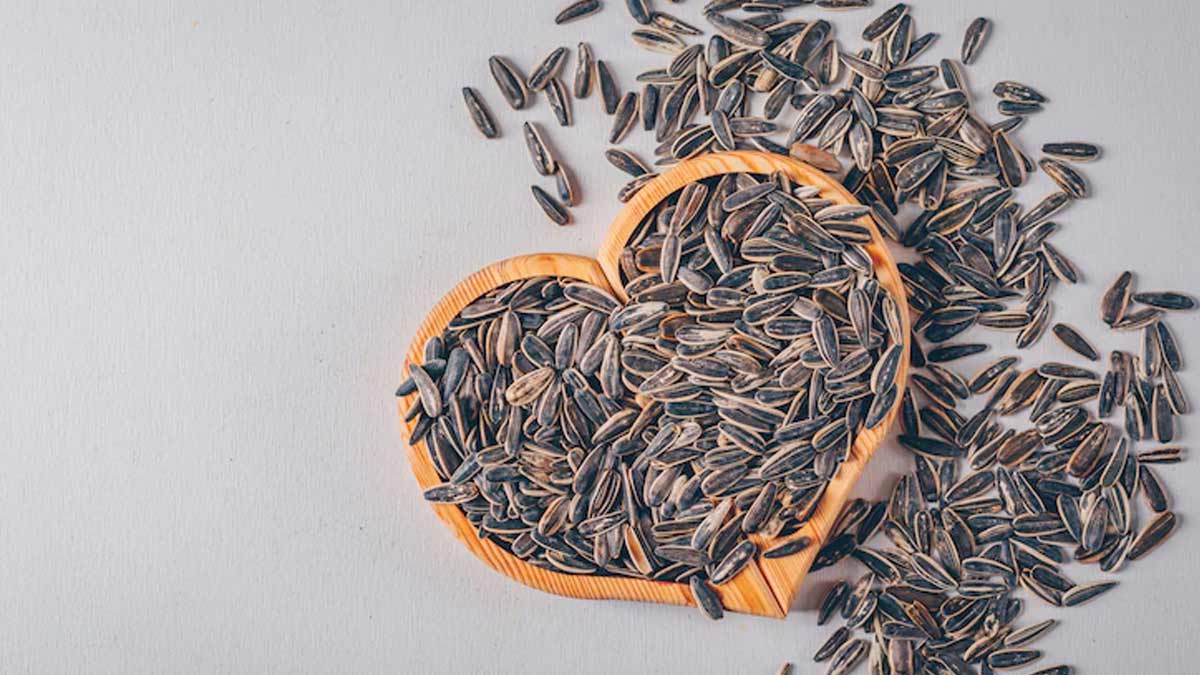
Winter is known to bring and aggravate many health problems. During this season, on the one hand, your immunity gets reduced, while on the other hand, the risk of heart attacks and stroke increases. Your diet leaves a significant impact on your immune system. One way you can add essential nutrients to your diet during the winter season is with sunflower seeds.
Health Benefits Of Sunflower Seeds In Winter
The seeds of sunflowers have a nutty flavour and can be roasted for flavour enhancement. These seeds are rich in fibre, protein, carbs, vitamin E, niacin, vitamin B6, iron, zinc, manganese, and copper. Here is why you should eat sunflower seeds during the winter season.
Eases Inflammation
Sunflower seeds are very helpful in treating chronic inflammation. Sunflower seeds contain vitamin E, which is believed to lower C-reactive protein levels, which is linked to an increased risk of diabetes and heart disease.
Also Read: 6 Seeds Rich In Fibre, Vitamins, & Protein For A Healthy Body
Lowers Risk Of Heart Disease

Sunflower seeds are also effective in reducing the risk of heart disease. High blood pressure makes you prone to the risk of heart disease. In winter, the risk of attacks and stroke increases. Sunflower seeds are helpful in preventing this risk. There are compounds in sunflower seeds that help in blocking the enzyme that constricts blood vessels. Sunflower seeds have magnesium, which helps in reducing the blood vessels.
Controls Cholesterol Level
Sunflower seeds are also a rich source of fibre, which is good for your gut. Fibre decreases the levels of bad cholesterol in the blood. Besides, on the one hand, vitamin B-3 in sunflower seeds reduces cholesterol levels, and vitamin B-5 helps increase the good cholesterol level in the blood.
Helps Diabetes Management

Sunflower seeds also help you to manage blood sugar levels and type 2 diabetes. Sunflower seeds can lower blood sugar levels, which is due to the plant compound chlorogenic acid.
Boost Immune System
When your immune system is strong, you are also saved from viral flu or cold. But during the winter season, the immune system gets compromised, and a great way to boost it is by taking sunflower seeds along with your diet. These seeds are rich in zinc, which activates the enzymes that help boost the immune system. Apart from this, the nutrients present in sunflower seeds also help in fighting the infection.
Also Read: 5 Health Benefits Of Pumpkin Seeds
Improves Skin Condition

Due to their antibacterial and antifungal properties, sunflower seeds are also effective in improving your skin. These seeds keep your skin clear and free from acne. Also, the presence of compounds like oleic and linoleic acids, aids in collagen formation, which slows down the ageing process.
Bottomline
Sunflower seeds are healthy; however, you should ask your dietician or doctor before including them in your diet. This is because eating sunflower seeds can also have certain disadvantages. For example, they contain high calories and sodium, and can cause stool blockages and allergies. For these reasons, it is better to take sunflower seeds in limited quantities and after knowing your dietary requirements.
Image Credits: freepik







